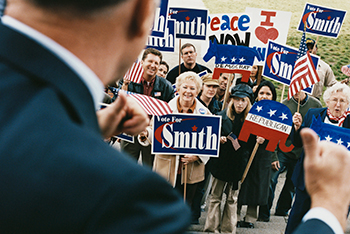 Jan. 20, 2016 – Late last year, Gov. Scott Walker signed into law 2015 Wisconsin Act 117 (“Act 117”), which repeals and recreates Wisconsin’s campaign finance laws.
Jan. 20, 2016 – Late last year, Gov. Scott Walker signed into law 2015 Wisconsin Act 117 (“Act 117”), which repeals and recreates Wisconsin’s campaign finance laws.
Separate legislation enacted on the same day (2015 Wisconsin Act 118) dissolves the Government Accountability Board (“GAB”) and replaces it with two independent commissions. The Ethics Commission will administer and oversee campaign finance (Wis. Stat. chapter 11), lobbying (subchapter III of chapter 13), and ethics laws (subchapter III of chapter 19). The Elections Commission will administer and oversee election administration laws (chapters 5 through 10 and 12 of the statutes).
Note that Act 117 is effective as of Jan. 1, 2016, but the dissolution of the GAB and creation of the two commissions is not effective until June 30, 2016. Although the GAB will administer the rewritten chapter 11 for six months, this article refers to the Ethics Commission throughout.
Drafted in response to numerous court decisions on Wisconsin campaign finance laws – including the Wisconsin Supreme Court’s decision last year in State ex rel. Two Unnamed Petitioners v. Peterson, related to the recent John Doe investigation into alleged campaign finance violations1 – Act 117 codifies contribution source restrictions, contribution limits, and the regulation of independent political speech.
It makes a number of changes to the regulation of political committees and reorganizes chapter 11, making it easier to navigate. A comprehensive rewrite of state law, Act 117 statutorily updates many aspects of how campaign finance is regulated in Wisconsin. This article highlights a number of the changes, followed by tables on contribution limits. (See Table 1 and Table 2.)
Increased Contribution Limits. Limits on contributions to candidate committees are generally increased or eliminated. Individual and political action committee (“PAC”) contribution limits are doubled; existing PAC limits are rounded to the nearest $1,000 and then doubled.
Contributions by candidate committees are now subject to the same limits as individuals rather than PACs. With the exception of contributions to the governor and the attorney general, this results in increased contribution limits for transfers by a candidate committee. Party and legislative campaign committee contributions are unlimited. Contribution limits to candidate committees are not indexed for inflation in future years.
Increased Contributions to Local Candidates. Limits on contributions to local candidates are also increased. While based on population of the jurisdiction or district the candidate seeks to represent, the cap is no less than $500 and no more than $6,000 for individual contributions and candidate committee transfers, and no less than $400 and no more than $5,000 for PAC contributions.
Unlimited Party Transfers. Political parties and legislative campaign committees may make unlimited contributions to candidate committees.
Increased PAC Contributions. The annual limit on PAC contributions to political parties and legislative campaign committees is doubled and set at $12,000. PACs may make unlimited contributions to other PACs and to a segregated fund established by a political party or legislative campaign committee provided that the fund does not make contributions to candidate committees or disbursements for express advocacy.
“PAC-Out” Limits Eliminated. Candidates and political parties are no longer limited in the total amount of contributions they may receive from PACs.
 Mike B. Wittenwyler, U.W. 1998, is an administrative and regulatory attorney at Godfrey & Kahn S.C., Madison, and the lead attorney in the firm’s political law group. His practice includes campaign finance, election law, ethics and lobbying regulation, and the tax regulation of political and lobbying activities.
Mike B. Wittenwyler, U.W. 1998, is an administrative and regulatory attorney at Godfrey & Kahn S.C., Madison, and the lead attorney in the firm’s political law group. His practice includes campaign finance, election law, ethics and lobbying regulation, and the tax regulation of political and lobbying activities.
 Jodi E. Jensen, U.W. 1995, is an administrative and regulatory attorney at Godfrey & Kahn S.C., Madison, and a member of the firm’s political law group. Her practice includes campaign finance, election law, and lobbying regulation.
Jodi E. Jensen, U.W. 1995, is an administrative and regulatory attorney at Godfrey & Kahn S.C., Madison, and a member of the firm’s political law group. Her practice includes campaign finance, election law, and lobbying regulation.
Corporations, Labor Organizations, and Tribes Restricted. Corporations, cooperatives, unincorporated associations, labor organizations, and federally recognized Indian Tribes may contribute unlimited amounts to independent expenditure committees and referendum committees. They may also make contributions of up to $12,000 annually to a segregated fund established and administered by a political party or a legislative campaign committee provided the fund does not make contributions to candidate committees or disbursements for express advocacy. Otherwise, these contributors are prohibited from making contributions.
LLC Contributions Permitted. Certain limited liability companies (“LLCs”) may contribute to committees, including candidate committees. These LLC contributions are treated as individual contributions and subject to the applicable limits. Prior to Act 117, all LLCs were treated as corporations prohibited from making contributions to committees.
In-Kind Valuation. For non-cash contributions, the requirements for establishing the value of in-kind contributions at fair market value and the value of polling per a statutory formula will not change. In-kind contributions do not include uncompensated services provided to a committee, even if the individual would normally charge a fee for those services.
Exception for Private Residence Events. In-kind contributions do not include the cost of invitations, food, and beverages for a candidate event at a private residence.
Every Contribution Itemized. Every contribution must include the name and address of a contributor unless it is an anonymous contribution of no more than $10. Previously, committees were not required to itemize contributions received of $20 or less. If an individual contributes more than $200 in a calendar year, his or her occupation – but not employer – must also be reported.
Reporting Form and Frequency. The contribution threshold for filing electronic campaign finance reports with the Ethics Commission is reduced from $20,000 to $1,000. Frequency of reporting by committees is generally unchanged with reports due twice a year in January and July and additional pre-primary and pre-election reports triggered by campaign activity. PACs and independent expenditure committees have additional reporting requirements for independent expenditures made during the 60 days prior to a primary or general election.
Registration, Local Elections. Candidates for local office, referendum committees advocating for or against a local referendum, and recall committees formed to recall local elected officials must register with the appropriate local clerk and file periodic reports. PACs, independent expenditures committees, and conduits that participate only in local elections must nonetheless register with the Ethics Commission and file periodic reports.
Unlimited Sponsorship Exceptions and No Reporting. Sponsors of PACs, independent expenditure committees, and conduits may spend unlimited amounts on administrative and solicitation activities. A sponsor is not required to separately register with the Ethics Commission or report its spending. Likewise, the committee or conduit it sponsors is not required to report the spending by its sponsoring organization.
Stale Conduit Funds. When a conduit contributor cannot be located, a conduit must now make five, rather than 10, good faith attempts to contact the contributor before redirecting stale funds. Other requirements for the redirection have not changed.
Independent Expenditures. Independent expenditure committees may receive unlimited contributions from PACs, other independent expenditure committees, corporations, cooperatives, federally recognized Indian Tribes, unincorporated associations, and labor organizations for the purpose of engaging in express advocacy – communications that expressly advocate for the election or defeat of a clearly identified candidate. These committees must file periodic reports detailing contributions received and disbursements made.
PACs, political parties, and legislative campaign committees may make independent expenditures as well, but they may not receive contributions from independent expenditure committees, corporations, cooperatives, federally recognized Indian Tribes, unincorporated associations, and labor organizations to fund them.
Individuals and organizations that make independent expenditures, but are not required to form a committee, are subject to limited reporting requirements on their spending. Unlike committees, these organizations are not required to report contributions received.
Impermissible Coordination Codified. An independent expenditure is coordinated when: 1) a candidate or candidate’s agent, legislative campaign committee of the candidate’s political party, or the candidate’s political party specifically requests an expenditure be made and the individual, organization or committee explicitly assents to the request before making the expenditure; or 2) a candidate or candidate’s agent, legislative campaign committee of the candidate’s political party, or the candidate’s political party controls the expenditure or the express advocacy communication.
If the expenditure complies with applicable source restrictions and contribution limits, an independent expenditure may be coordinated and must be reported to the Ethics Commission. A coordinated expenditure that violates either source restrictions or contribution limits subjects the donor and the candidate to penalties.
Issue Advocacy Exempt. Issue advocacy communications – communications that avoid any statements of express advocacy and provide information about a public official, candidate or public policy without calling for anyone’s election or defeat – are not subject to regulation under chapter 11.
Use of Campaign Finance Reports. Information in campaign finance reports can now be used by other candidates and organizations in soliciting contributions and for other political activities. The only restriction remaining prohibits the sale or use of information for a commercial purpose.
Conclusion
In 2014, the Seventh Circuit Court of Appeals described Wisconsin’s campaign finance laws as “labyrinthian and difficult to decipher” and urged the Wisconsin Legislature to update state law. With Act 117, the state legislature did as directed by the court.
Table 1: Candidate Committee Contribution Limits
|
Individual Contributor* (including sole proprietorships, partnerships and certain LLCs) |
PAC Contributor |
Candidate Committee Contributor |
Political Party Contributor |
Legislative Campaign Committee Contributor |
| Governor |
$20,000 |
$86,000 |
$20,000** |
Unlimited |
Unlimited |
| Lt. Governor |
$20,000 |
$26,000 |
$20,000** |
Unlimited |
Unlimited |
| Attorney General |
$20,000 |
$44,000 |
$20,000 |
Unlimited |
Unlimited |
| Justice |
$20,000 |
$18,000 |
$20,000 |
Unlimited |
Unlimited |
| Secretary of State/State Treasurer |
$20,000 |
$18,000 |
$20,000 |
Unlimited |
Unlimited |
| State Senate |
$2,000 |
$2,000 |
$2,000 |
Unlimited |
Unlimited |
| State Assembly |
$1,000 |
$1,000 |
$1,000 |
Unlimited |
Unlimited |
*A candidate may make unlimited contributions to his or her candidate committee from personal or marital funds or property.
**There is no limit on the transfer of contributions between the governor and lieutenant governor of the same political party.
Table 2: Other Committee Contribution Limits
|
Corporation, Cooperative, Unincorporated Association, Labor Organization, Indian Tribe |
Individual Contributor |
PAC Contributor |
| PAC |
Prohibited |
Unlimited |
Unlimited |
| Political Party |
Prohibited |
Unlimited |
$12,000 Annually |
| Legislative Campaign Committee |
Prohibited |
Unlimited |
$12,000 Annually |
| Segregated Fund of Political Party or Legislative Campaign Committee* |
$12,000 Annually |
Unlimited |
Unlimited |
| Independent Expenditure Committee |
Unlimited |
Unlimited |
Unlimited |
| Recall Committee |
Prohibited |
Unlimited |
Unlimited |
| Referendum Committee |
Unlimited |
Unlimited |
Unlimited |
*A segregated fund cannot use its monies for the purpose of making contributions to candidate committees or disbursements for express advocacy.
Endnotes
1 For a summary of recent litigation affecting Wisconsin’s law prior to Act 117, see “Decoding the Maze: Wisconsin’s Campaign Finance Laws,” Wisconsin Lawyer (Oct. 2014).
